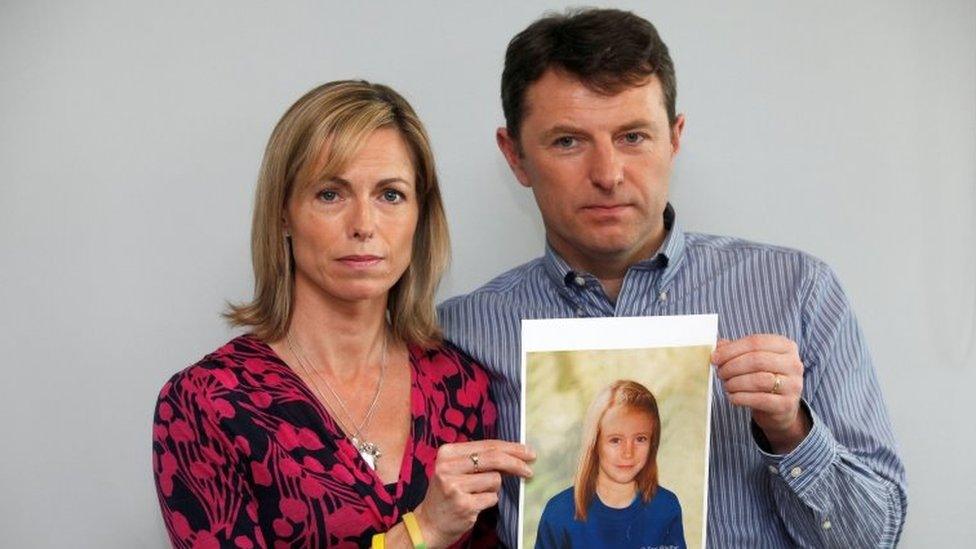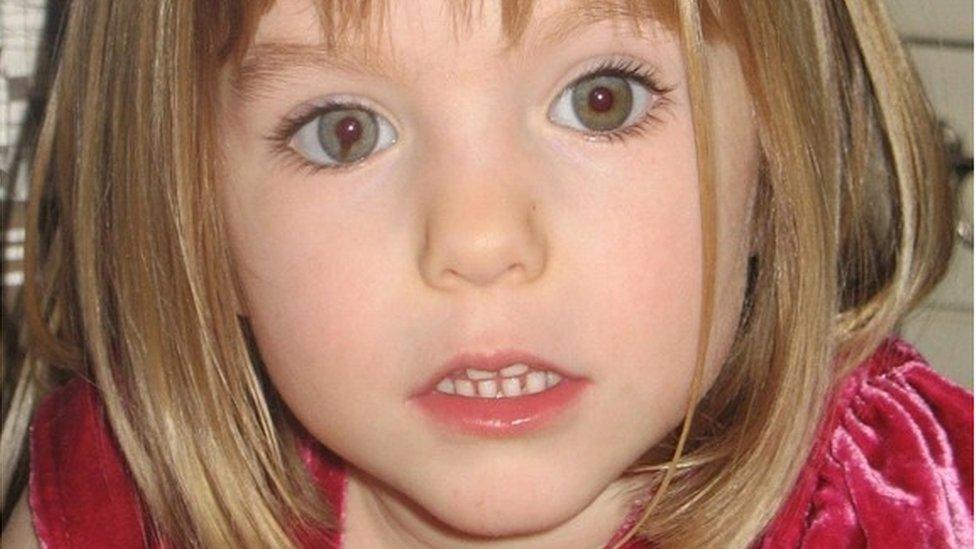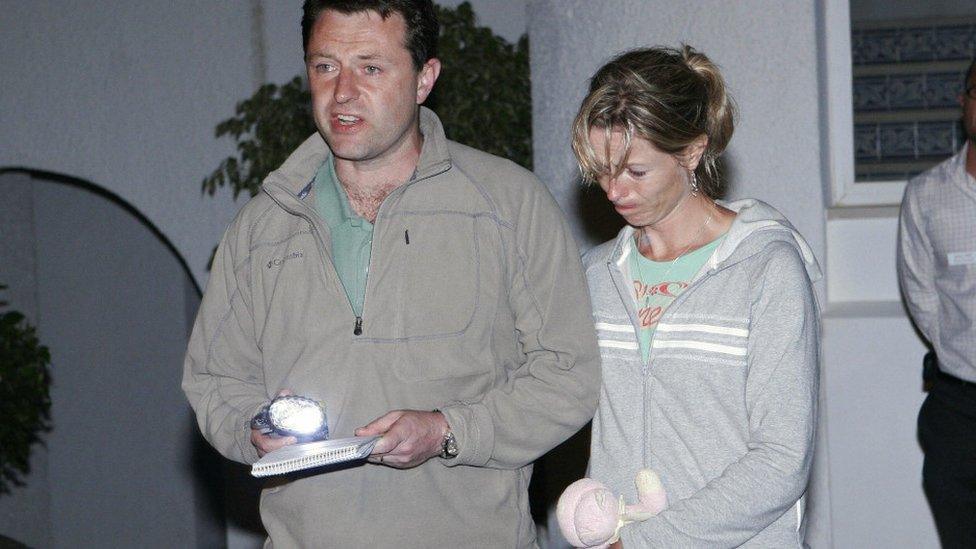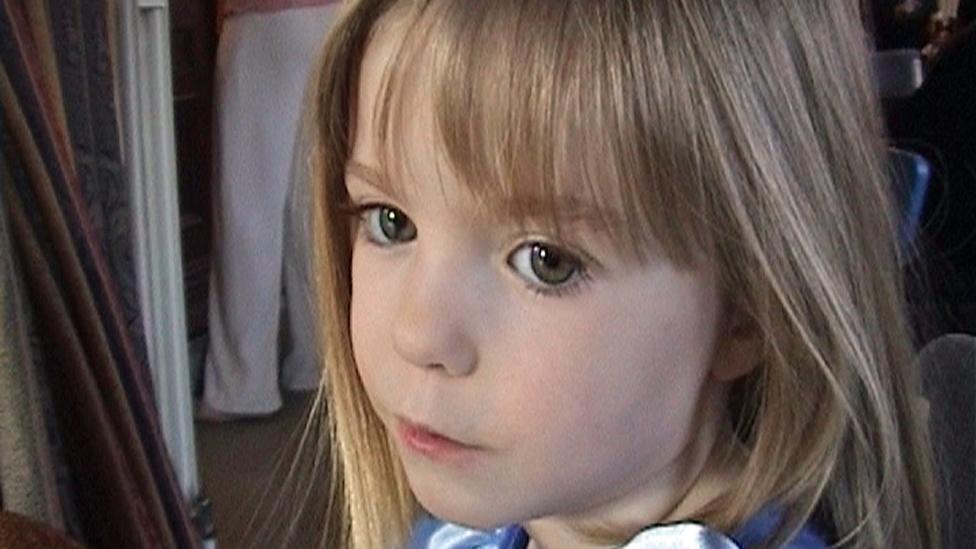Madeleine McCann: False turns and a final breakthrough?
- Published

Kate and Gerry McCann pose with an image of how their daughter Madeleine, who went missing aged three, might have looked in 2012
The disappearance of Madeleine McCann in May 2007 was a shocking family tragedy. A perfect holiday became the most awful event imaginable. And 13 years on, still no answers.
For all the years that she has been missing, her parents - and a small group of British police officers who took over the case in 2011 - have not given up hope of finally discovering what happened.
Now, with a potentially astonishing new lead on a known sex offender from Germany, the question is whether they are, finally, close to the truth after so many false turns.
On 3 May 2007 Madeleine was on holiday with her siblings and parents, Kate and Gerry McCann, in an apartment in the Portuguese resort of Praia da Luz.
Her parents were eating dinner with friends a short walk from the apartment - and when Mrs McCann went back to check on the three sleeping children, she discovered Madeleine was gone.
Through the night, local police and volunteers began to search. As the hours ticked by, more and more people gave up their holidays and time to find the little girl.
But within days, the first of a series of major wrong turns arguably hampered the investigation.
Portuguese police named a local British-Portuguese property consultant as a suspect.
He became the centre of an erroneous police inquiry - and enormous attention from the British press.
But he had nothing to do with the disappearance - and 11 British newspapers eventually paid him £600,000 in libel damages after wrecking his life.

Madeleine went missing shortly before her fourth birthday from an apartment in Praia da Luz
And a month after Madeleine's disappearance, the Portuguese investigation was stalling.
There was an appeal for information on an unknown figure seen carrying a child - but a police chief admitted potentially vital forensic evidence had not been secured in the apartment.
The chance of finding fingerprints, DNA or fibres linking the scene to an abductor were lost.
By July, the local Portuguese police were at a dead end. They asked the UK to help - and a team of experienced search detectives and sniffer dogs were flown in.
The British team went back to basics with an agonisingly meticulous search, the gold standard for murder inquiries in the UK.
They did not find any leads - and in September 2007, with Madeleine's parents still in turmoil, the local police suddenly named them as suspects. There was no evidence to support that supposition, and that line of inquiry was later abandoned.
Naming the parents as suspects felt to many observers at the time as a desperate clutching at straws by an investigation on the rocks. And 14 months after Madeleine McCann disappeared, the Portuguese authorities shelved its inquiry as unsolved.
The McCanns, from Rothley, Leicestershire, were convinced their daughter had been abducted.
The UK's Child Exploitation and Online Protection Centre, experts in the trafficking of children into sexual abuse, became involved and in the following years tried to keep interest alive with artist's images of what Madeleine would now look like as she grew up.
Turning point
In 2011, the McCanns lobbied then Prime Minister David Cameron to do more, and a senior Scotland Yard team were asked to review thousands of pages of evidence.
That decision may prove the crucial turning point.
The Metropolitan Police ended up with a list of 600 people they needed to find out more about and ultimately 41 potential suspects.
Behind the scenes a tantalising lead began to emerge.
Stranger kidnaps of children are rare. They tend to involve calculating abusers who have thought carefully about how they will do it. People who have a plan and know the area where they will strike.
Detectives reasoned that if Madeleine was kidnapped, the culprit could be German or Dutch - the two other predominant nationalities in the resort, along with British and Portuguese.
In 2013 the German equivalent of BBC TV's Crimewatch launched an appeal asking for any information about two German-speaking men at Praia da Luz.
That TV appeal led to a tip-off to German federal detectives, although it is not clear what it was or whether an individual was named.

The Ocean Club in Praia da Luz where the McCann family were staying
Then, around the 10th anniversary of Madeleine's disappearance, the German Federal Police received more information that did identify a man who set alarm bells ringing, someone whose name had been known to Scotland Yard.
According to the German Federal Police, the man is a sex offender - they have called him a "predator" - who has been convicted of offences against girls and is currently in prison.
He is also known to be a burglar, with experience of breaking into apartments.
Between 1995 and 2007 he was living a transient lifestyle in the Algarve and odd-jobbing in catering. At the same time, he is believed to have burgled holiday apartments and hotels and dealt drugs.
They now know that this man was close to the McCann holiday apartment at the critical time on the night she disappeared in 2007, and he received a half-hour phone call from an unknown person.
He had been using two vehicles, a VW camper van and a Jaguar, with the British-made car having been re-registered to another person the day after Madeleine disappeared.
He has also been connected to two properties, one of which German police have described as a hideaway for stolen goods. Both homes are small, villas on quiet country lanes.
One is a 10 minute drive from Praia da Luz. The other lies just over a mile away - and is, in turn, just a mile from grassy land where British police carried out an extensive search in 2014.


Who is the suspect? Neither German investigators nor Scotland Yard will confirm that name, but German media have identified him as Christian B.
Did this man take Madeleine McCann? Was a dangerous sexual offender effectively hiding in plain sight in the middle of a peaceful holiday town? It would not be the first time - almost everywhere in the world there are stories of predatory offenders locating themselves in resorts.
At the moment, we just don't know. But one thing is certain in the minds of the German police who may unlock this tragedy. They believe Madeleine McCann is dead.
And while her disappearance has always been a missing person inquiry in the UK - in Germany, this is now a hunt for the final clues that could catch a murderer.
- Published22 April 2022

- Published4 June 2020

